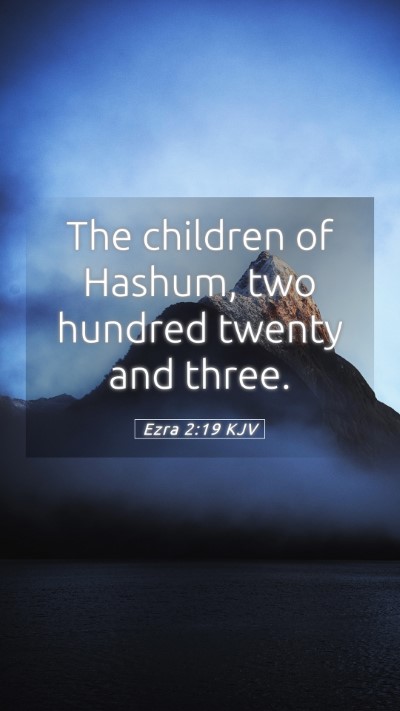Understanding Ezra 2:19
Ezra 2:19 states: "The children of Hashum, two hundred twenty and three." This verse is part of a larger passage that lists the families who returned to Jerusalem from Babylonian exile. In this analysis, we will explore the meaning of this Bible verse through insights derived from esteemed public domain commentaries.
Bible Verse Interpretations
Contextual Background
Ezra’s account serves to document the return of the exiles. It emphasizes the restoration of the Jewish community and the importance of the families that contributed to this revival. As noted by Matthew Henry, these lists highlight God's faithfulness to His promise of restoration following the Babylonian captivity.
Family Enumeration
Each family is counted, and this specific mention of Hashum’s descendants is significant as it reflects the structured nature of the returning community. According to Albert Barnes, such enumerations show the meticulous nature of the restoration process, reinforcing the organization among the families returning to their ancestral land.
Symbolism in Numbers
The number 223 appears ordinary but symbolizes completeness and accountability in the restoration effort. Adam Clarke notes that the detailed census demonstrates the necessity of each family and individual in rebuilding the nation. The mention of numbers reminds us of God’s meticulous attention to detail in His plans for His people.
Bible Study Insights
Understanding significant families
The family of Hashum, as included in this verse, suggests that restoration after exile is not just about personal revival but also about familial and communal identities. Each family unit's role underlines the importance of community in the life of faith. This can be particularly relevant during Bible study groups as discussions can revolve around the roles families and communities play in spiritual growth.
Application of Ezra 2:19 in Daily Life
This verse encourages us to recognize the importance of our families and communities in our spiritual journeys. How do our family ties reflect our commitments to God? The application of this verse could encompass discussions about how families impact personal faith and dedication, inviting families to be engaged in online Bible study or dedicated Bible study plans.
Commentary on Family and Ancestry
Understanding the lineage presented in Ezra conveys profound respect for ancestry and heritage. Each group's identity contributes to a unified restoration, reflecting an essential principle of biblical history that ancestry influences community identity and responsibility. Matthew Henry emphasized that each family is crucial in contributing to the whole. This notion can encourage us to study our heritage within our spiritual context.
Further Bible Study Resources
For those diving deeper into the meaning of Bible verses, it is essential to utilize various Bible study tools and Bible study guides. These tools can unlock profound insights into ancient texts and their contemporary applications, ensuring that we understand Scripture thoroughly.
Related Bible Cross References
- Nehemiah 7:18
- Ezra 2:8
- Ezra 2:42
- Exodus 12:37
- Revelation 21:12
Conclusion
In summary, Ezra 2:19 is more than a mere enumeration; it encapsulates a story of restoration, community, and divine faithfulness. By studying this verse and similar passages, we gain a richer Bible verse understanding that invites us to reflect on our individual and communal faith journeys. Engaging with others through Bible study lessons will further enhance our comprehension and application of these timeless truths.


